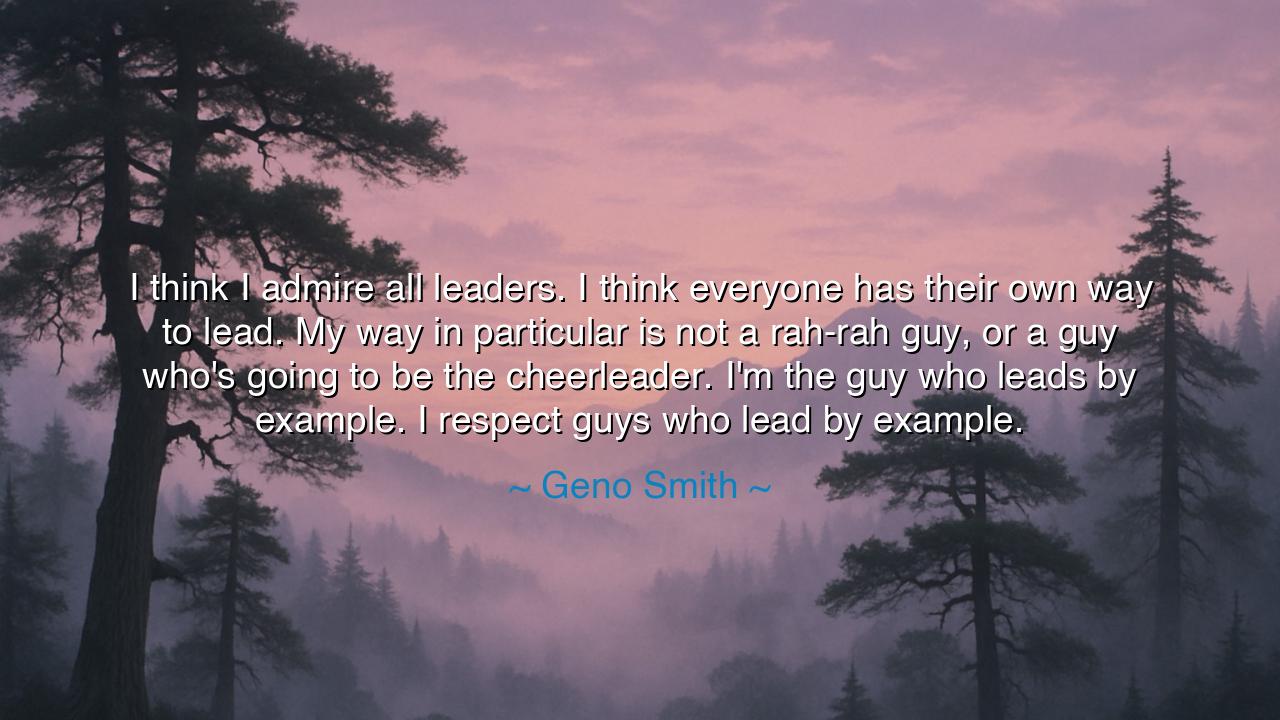
I think I admire all leaders. I think everyone has their own way
I think I admire all leaders. I think everyone has their own way to lead. My way in particular is not a rah-rah guy, or a guy who's going to be the cheerleader. I'm the guy who leads by example. I respect guys who lead by example.






In the words of Geno Smith, “I think I admire all leaders. I think everyone has their own way to lead. My way in particular is not a rah-rah guy, or a guy who’s going to be the cheerleader. I’m the guy who leads by example. I respect guys who lead by example.” we find a profound reflection on the true nature of leadership. His words speak to the heart of what it means to guide others—not with the loudest voice, but with quiet action. In a world often enamored with rhetoric, with those who command attention with their charisma and fervor, Smith offers us a reminder that leadership is not measured in decibels but in the consistency of one’s deeds. He acknowledges that all paths of leadership have value, but the path of leading by example is one that endures, transcending the momentary noise of grand speeches.
The origin of this quote lies in the humility and quiet strength of Geno Smith, a leader who has chosen to let his actions speak louder than his words. In the fast-paced world of sports, where team captains are often expected to rally their troops with passionate speeches and fiery exhortations, Smith stands apart, emphasizing that true leadership is not about the spectacle, but about setting the standard through integrity and commitment. He recognizes that leadership comes in many forms, but in his view, the most respectable form is one that does not demand attention but earns it through the force of example.
To the ancients, leadership was not a title bestowed, but a role earned through deeds. The great warriors of old—Alexander the Great, Cyrus the Great, and King Leonidas—were not admired merely for their victories, but for the way they led their men in battle, side by side, demonstrating the virtues they demanded from others. Alexander, in his military campaigns, led with a calm ferocity, charging into battle alongside his troops, showing them the courage he required from them. Cyrus the Great, revered for his wisdom and fairness, governed not from a throne, but from the midst of his people, earning their loyalty through example rather than decree. This spirit of leadership, grounded in actions and not words, is what Geno Smith honors in his quote.
Consider also the life of Abraham Lincoln, a man who led through a time of unprecedented turmoil. While many of his contemporaries sought to stir the people with speeches, Lincoln chose instead to act with a quiet, unshakable resolve. His leadership was not one of flamboyance or pageantry, but of steady perseverance in the face of national division. He respected the value of humility in leadership, knowing that the most powerful example he could set was to stand firm in his convictions, regardless of public opinion. It was not his oratory alone that saved the Union, but the example he set in moments of personal and national crisis.
Smith’s words also speak to a moral truth: that leadership is not about forcing others to follow, but about showing them the way. The leader who leads by example earns respect not by demanding it, but by embodying the values they expect in others. This truth is as old as time. Consider Confucius, whose teachings emphasized the idea that a leader must first cultivate virtue within themselves before they can expect it from others. “A man who leads by example,” Confucius said, “is a man who wins hearts, not by command, but by living the principles he espouses.”
The lesson from Smith’s reflection is clear: true leadership is found not in how loudly you speak, but in how consistently you live your values. The great leaders of history did not stand apart from their people; they walked among them, led them, and showed them the way through their own actions. This kind of leadership requires discipline and self-awareness. It asks that we not only aspire to greatness but live it every day, that we model the behavior we seek in others. As Smith rightly points out, we do not need a cheerleader at the helm; we need someone who will do the work, day in and day out, with quiet strength.
Let this truth be a guide for us all: if we wish to lead, we must first lead ourselves. The world will not remember the loudest voice, but the most steadfast heart. Our actions are the truest measure of our leadership, and it is by leading through example that we earn the trust and respect of those we hope to guide. Respect is not commanded, it is earned through the consistency of our deeds and the integrity of our character. Let us then, as Geno Smith suggests, walk the path of quiet leadership, knowing that the greatest power we wield is the example we set for others.






AAdministratorAdministrator
Welcome, honored guests. Please leave a comment, we will respond soon